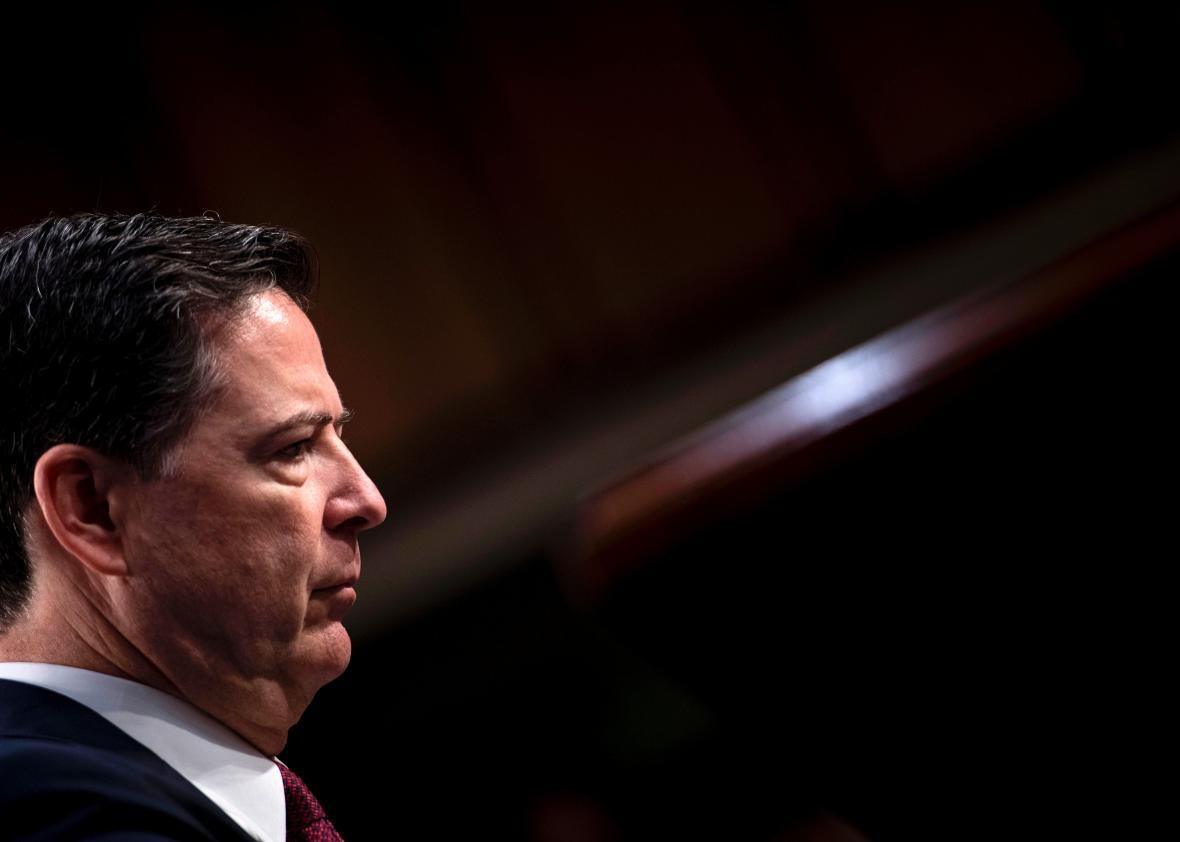James Comey’s nearly three hours of testimony Thursday before the Senate Intelligence Committee yielded plenty of new revelations and eyebrow-raising findings. But almost as interesting were the many topics about which the former FBI director declined to say anything at all. Here’s a rundown of curious points Comey was asked to elaborate on but couldn’t—at least “in an open setting.”
Details about the “Steele Dossier” of unverified allegations about the Trump campaign and Russia:
Sen. Richard Burr: At the time of your departure from the FBI, was the FBI able to confirm any criminal allegations contained in the Steele document?
Comey: Mr. Chairman, I don’t think that’s a question I can answer in an open setting because it goes into the details of the investigation. …
Burr: And when you read the dossier, what was your reaction, given that it was 100 percent directed at the president-elect?
Comey: Not a question I can answer in open setting, Mr. Chairman.
Also:
Sen. Angus King: In regard to [Trump] being personally under investigation, does that mean that the dossier is not being reviewed or investigated or followed up on in any way?
Comey: I obviously can’t comment either way. I talk in an open setting about the investigation as it was when I was head of the FBI. It is Bob Mueller’s responsibility now. I don’t know.
Why he publicly announced his conclusion to the investigation of Hillary Clinton’s email use:
Burr: Were there other things that contributed to that, that you can describe in an open session?
Comey: There were other things that contributed to that. One significant item I can’t, but know the committee’s been briefed on, there’s been some public accounts of it which are nonsense, but I understand the committee has been briefed on the classified facts.
Why a February New York Times’ report was wrong about Trump campaign contact with Russian intelligence figures:
Sen. James Risch: That upset you to the point where you surveyed the intelligence community to see whether you were missing something in that. Is that correct?
Comey: That’s correct. I want to be careful in open setting, but—
Risch: I’m not going to go any further than that, so thank you.
The full basis for the investigation into National Security Adviser Mike Flynn:
Sen. Roy Blunt: On the Flynn issue specifically, I believe you said earlier that you believe the president was suggesting you drop any investigation of Flynn’s account of his conversation with the Russian ambassador. Which was essentially misleading the vice president and others?
Comey: Correct. I’m not going to go into the details but whether there were false statements made to government investigators, as well.
And later:
Sen. Angus King: Now, on the Flynn investigation, is it not true that Mr. Flynn was and is a central figure in this entire investigation of the relationship between the Trump campaign and the Russians?
Comey: I can’t answer that in an open setting, sir.
King: Certainly, Mr. Flynn was part of the so-called Russian investigation? Can you answer that question?
Comey: I have to give you the same answer.
How the FBI obtained evidence in the Flynn investigation and its status:
Cotton: I want to turn your attention now to Mr. Flynn. … There’s a story on January 23rd in the Washington Post that says, entitled “FBI reviewed calls with Russian ambassador but found nothing illicit.” Is this story accurate?
Comey: I don’t want to comment on that, Senator. I’m pretty sure the bureau has not confirmed any interception of communications. So, I don’t want to talk about that in an open setting.
Cotton: But you can’t confirm or deny that the conversation happened and we would need to know the contents of that conversation to know if it in fact was proper.
Comey: I don’t think I can talk about that opening setting. Again, I’ve been out of government a month. So, I also don’t want to talk about things when it’s now somebody else’s responsibility. But maybe in the classified setting we can talk more about that.
Cotton: Did you ever come close to closing the investigation on Mr. Flynn?
Comey: I don’t think I can talk about that in open setting either.
Anything about Russian bank VEB, which is alleged to have ties to President Trump and Jared Kushner:
King: What do you know about the Russian bank VEB?
Comey: Nothing that I can talk about in an open setting. I know that it exists.
Collusion between the Trump campaign and Russian officials:
Sen. Tom Cotton: Russia’s hacking of those e-mails and the allegation of collusion. Do you think Donald Trump colluded with Russia?
Comey: That’s a question I don’t think I should answer in an opening setting.
Communication between the Trump campaign and Russian officials:
Sen. Kamala Harris: Are you aware of any meetings between the Trump administration officials and Russian officials during the campaign that have not been acknowledged by those officials in the White House?
Comey: That’s not—even if I remembered clearly, that’s not a question I can answer in open setting.
Harris: Are you aware of any questions by Trump campaign officials or associates of the campaign to hide their communications with Russian officials through encrypted means?
Comey: I have to give you the same answer.
Harris: In the course of the FBI’s investigation did you ever come across anything that suggested that communication, records, documents or other evidence had been destroyed?
Comey: I think I’ve got to give you the same answer because it would touch on investigative matters.
Harris: And are you aware of any potential efforts to conceal between campaign officials and Russian officials?
Comey: I have to give you the same answer.
Possible blackmail:
Sen. John McCain: Are you aware of anything that would lead you to believe, could information exist that could coerce members of the administration or blackmail the administration?
Comey: That’s not a question I can answer, Senator.
